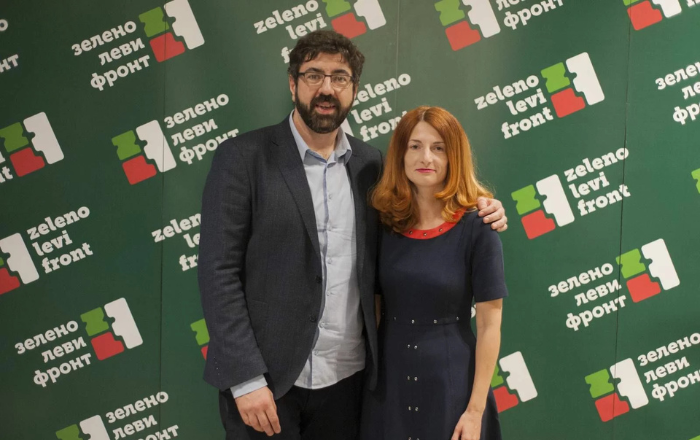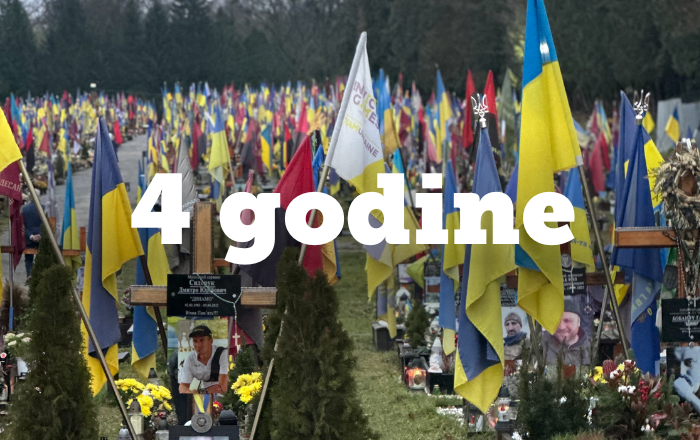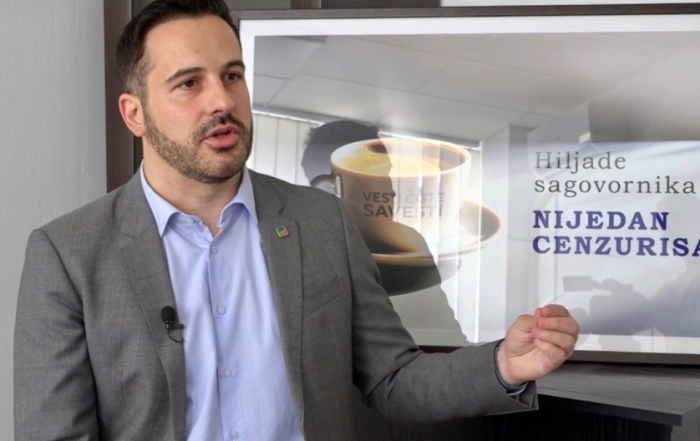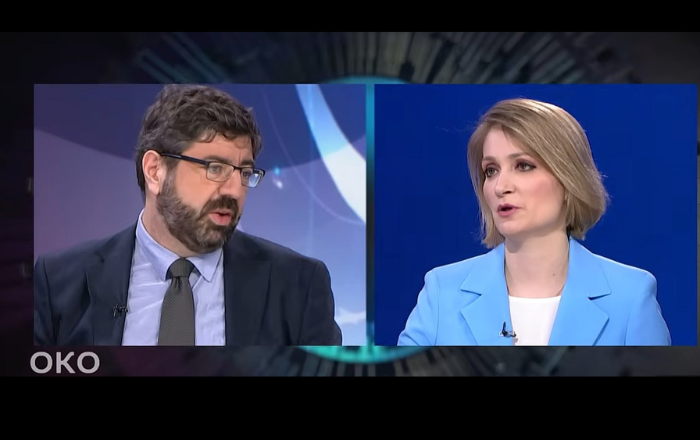How can civil society and politics work together to shape a more just, sustainable future? Radomir Lazović and Biljana Đorđević are central figures in the progressive political movement in Serbia. Lazović, an activist and co-founder of the initiative “Ne davimo Beograd” (Don’t Let Belgrade Drown), had worked with the Belgrade office of the Heinrich Böll Foundation on various projects for many years, and Đorđević, a political scientist and professor at the University of Belgrade, together lead the Zeleno-levi front (ZLF). This party was the result of a merger of “Ne davimo Beograd” and four other civic groups and was founded on July 14, 2023. ZLF has been represented in the National Assembly of Serbia following the December 2023 elections, though the Ne davimo Beograd movement had already had MPs prior to the establishment of ZLF. Since December 2024, ZLF has been a full member of the European Green Party (EGP).
In conversation with Heinrich Boell Foundation Belgrade, Lazović and Đorđević reflect on their political careers, the challenges in Serbia, and the importance of international partnerships. The interview was conducted by Nino Lejava.
Serbia is increasingly classified as a hybrid regime. How do you experience the erosion of democratic institutions, and what is the opposition doing to counter this trend?
Biljana Đorđević: Regrettably, we’ve never known better electoral conditions than these in our hybrid regime because our party emerged from the legacy of the local grassroots political movement Ne davimo Beograd, which first contested the Belgrade local elections in 2018. According to many analysts, after those elections, Serbia definitively fell into the category of hybrid regimes.
Therefore, we’ve always maintained that in the struggle for basic democracy, the rule of law, and against regime violence and repression, we must cooperate with the rest of the opposition, which we have consistently done. This has often forced us to choose between the fundamental fight for democracy and clear programmatic-ideological differentiation from other opposition parties.
We formed our own party because we didn’t believe there was an existing one we could join that would represent our values. We didn’t want to join existing opposition parties that had been in power and made a series of poor decisions for the country, such as privatization policies that contributed to systemic corruption, and which couldn’t reform internally to defeat the Serbian Progressive Party (SNS)in elections, but kept fracturing due to leaders’ egos.
Finally, there was no green-left party in Serbia, so we have truly created something new. But then, because we can’t even present our program (we can’t be heard on public media, and as political activists we’re constantly under aggressive attacks from private regime-controlled media), we’re forced to focus on basic demands for establishing free and fair election conditions – as if Serbia were a pre-political society.
Together with your partners in the parliamentary opposition, you have made a proposal to form an interim technical government to lead Serbia out of the crisis: How do you now assess the reaction of society and the government?
Biljana Đorđević: Most opposition parliamentary parties initially came forward individually with proposals for a transitional government. We then suggested harmonizing these proposals and formally presenting them to the public as a Government of Public Trust when Miloš Vučević’s Government officially collapsed. This was our proposal for peacefully establishing a legitimate future government, as Vučić’s regime has clearly lost legitimacy – which is evident on a daily basis considering the protests going on across the country. At the same time, we lack the conditions for holding free and fair elections, which a transitional government should ensure – similar to what happened in North Macedonia.
That is why we clearly defined the mandate of this proposed government with specific goals to be accomplished within a 9-month timeframe: to fulfill student demands (students have been blocking their faculties for more than 4 months) and to create conditions for free and fair elections. We primarily mean revising the voter registry and electing new members to the REM Council, so that this body can finally become independent. These are also obligations from Serbia’s Reform Agenda, which must be fulfilled to access funds from the Growth Plan.
What’s particularly important to us in the Green Left Front is ending all political pressure on the education sector. This includes financial and disciplinary measures taken against teachers in primary and secondary schools for work stoppages and strikes meanwhile, similar retaliation has begun against university professors who support the students’ blockade. We also want legal amendments to restore schools’ autonomy in selecting headmasters, since headmasters are currently political appointees by the Education Minister, tasked with disciplining schools.
I believe part of the public responded quite positively to our proposal, but the students – currently the most important segment of rebellious society in Serbia – were late in starting to discuss this idea. This resulted in the concept of a transitional expert government which largely overlaps with our proposal, being supported by some blocked universities but not by two key Belgrade universities. Consequently, we failed to generate clear, unified pressure and demands toward the authorities, who predictably ignored us and formed an even worse government that will do nothing to resolve the socio-political crisis, but will instead continue retaliating against all who rebel.
The opposition has pointed out massive irregularities in the December 2023 elections, as did the ODIHR report. What levers does Serbian civil society and the opposition have to counter recurring manipulations?
Radomir Lazović: Unfortunately, this story about conditions for free and fair elections is like Groundhog Day – it has been one of the fundamental political issues for at least the past 7 years, from the moment Serbia began being classified as a hybrid regime or electoral autocracy on democracy indices. We’ve tried everything – protests, demands, government working groups with civil society representatives regarding voter registry revision (which were sabotaged through government tricks and abuses), boycotting elections at all levels in 2020, inter-party dialogue with European Parliament mediators in 2021 that yielded almost no results, participation in the 2022 elections followed by terrible aggression toward the opposition in the National Assembly and disregard for basic parliamentary procedures.
Finally, in the 2023 elections, thanks to CRTA, an election watchdog NGO, a new element of voter registry manipulation was uncovered – the migration of voters specifically to steal the Belgrade City Assembly elections. People from cities where local elections were not being held were registered in Belgrade’s voter registry to vote for the regime, then returned to their original places of residence.
Afterward, an Assembly working group was formed with government, opposition, and civil society representatives to address voter registry revision, but the government obstructed its work so severely that both opposition and civil society representatives eventually abandoned it. The only approach we haven’t tried is a transitional government tasked with establishing proper electoral conditions, which is why we’re proposing it now.
The Vučić regime maintains close relations with Russia and China while officially pursuing EU integration. How do you assess this balancing act, and what role does the Serbian opposition play in this?
Radomir Lazović: The Vučić regime’s foreign policy is often described as a “complex balancing act,” but in essence, it leverages Serbia’s public goods and strategic resources to appease major global powers while, on paper, pursuing EU integration. This included selling public assets like the oil refining industry to Russia, copper and gold reserves to China, and engaging in weapons trade with Ukraine and Israel through intermediaries to appease the U.S., alongside promises of lithium to the EU and purchasing Rafale jets from France. In return, these major powers have granted Vučić unchecked freedom in domestic affairs, leading to the systematic dismantling of Serbia’s democratic institutions.
We have repeatedly called on the international community to critically assess whether this approach has yielded tangible results. Has Vučić reaally delivered on anything? On Kosovo – no. Key agreements remain largely unimplemented. On regional relations – no. Regional stability is undermined by Serbia’s continued interference in neighboring countries. On European integration – no. The accession process is virtually dead. On Russia sanctions – no. On internal good governance – no. His rule is marked by repeated instability, permanent crisis, and election fraud, rendering the country increasingly ungovernable. The reliance on Chinese loans, free from political conditions (at least publicly stated ones), has further indebted Serbia without addressing systemic issues.
I believe the age of stabilitocracy is over. Vučić’s capacity to fulfill promises to anyone is rapidly diminishing, hindered by the lack of internal and external stability and the absence of a strong mandate for decisive action. In contrast, the Green-Left Front represents a new generation of leadership ready to tackle international challenges head-on, championing a singular focus on reinvigorating Serbia’s EU accession process, completing it, and securing the country’s place within the European Union.
Where do you see Serbia’s role and place in the current fragile world order? The Serbian government and its media allies have rejoiced at the news of Trump’s victory – how does this reconcile with the country’s proclaimed EU-orientation?
Biljana Đorđević: The Serbian regime celebrates whenever a like-minded government emerges – one that disregards constitutional principles, the rule of law, democratic values and freedoms. Autocrats and right-wing leaders globally have mastered the art of cooperation, aligning their strategies, supporting one another, and learning from each other’s successes. This coordination allows them to advance their agendas with striking efficiency, often at democracy’s expense. Meanwhile, democrats and progressives struggle to achieve the same level of unity and strategic collaboration.
There’s much to learn from their methods – not to emulate undemocratic practices, but to understand how effective cooperation can strengthen democratic values and institutions. Serbia holds regional significance within the Balkans, where its influence and economic interests are most prominent, while its role in Europe reflects interconnected yet peripheral engagement. In the fragile global order, Serbia wields limited power. Like all small nations, Serbia’s primary interest in global affairs lies in respect for international law and active participation in a stronger, reformed, and more effective United Nations. Unlike great powers, small nations depend significantly on international law for protection and stability.
Regionally, the Green-Left Front would prioritize forming strong, enduring ties with neighboring countries, recognizing the European Union as Serbia’s most natural partner. In the EU, we can more easily find the values and way of life that the Green-Left Front seeks to uphold, offering both a sustainable economic model and a political shield against global uncertainties. This alignment is central to our vision for ensuring Serbia’s future stability, prosperity, and integration into a more secure and cooperative regional framework.
How do you assess the March 15 protest in Belgrade and the overall increasingly prevalent misuse of the state apparatus to keep the regime in power?
Radomir Lazović: The March 15 protest was historic because, according to conservative estimates, over 300,000 people participated – almost three times more than the demonstrations to prevent electoral fraud on October 5 2000, that brought down Milošević’s regime. This massive turnout occurred despite the regime shutting down intercity train and bus lines and suspending city transportation to prevent people from reaching Belgrade. Additionally, they organized a counter-rally by establishig a thug fortification constructed in Pionirski Park (the space between the Presidential Palace and the National Assembly where the students’ protest was planned) to provoke violent incidents as an excuse for brutal police action against peaceful demonstrators – a tactic protesters immediately recognized.
As the protest remained non-violent and extraordinarily massive, the most shocking act against protesters was the use of an unidentified sonic weapon during a moment of silence paying respect to victims of the canopy collapse in Novi Sad. This led to panic, a stampede, and physical injuries. An intervention like this could not have happened without knowledge from someone in the regime, whether carried out by state officials or criminal para-police formations. Over 3,000 people have testified about this incident, and civil society organizations have alerted the United Nations and European Court of Human Rights. A criminal complaint for terrorism has also been filed against unidentified persons.
Independent media and NGOs are under increasing pressure. How do you view the recent escalation of pressure and attacks, and what possibilities do they still have to influence public opinion, and how can international partners support them?
Biljana Đorđević: In late February, the regime launched a more brutal attack on civil society when criminal police officers raided the premises of prominent civil society organizations, claiming this came at the request of the USA regarding an investigation into USAID money flows (ironically, the primary recipients thereof were the Government and its ministries, the National Assembly, and the Supreme Court). In reality, this was retaliation against organizations that have for years exposed the regime’s misdeeds and illegal actions, such as Građanske inicijative (Civic Initiatives), which revealed the illegal process of electing REM (Regulatory Body for Electronic Media), Council members, or CRTA, which proved electoral fraud in the December 2023 elections and exposed the mechanism of voter migration.
Although this prompted quick reactions from international partners, I’m certain these actions significantly impact these organizations, exhausting them through the resulting legal processes, though thankfully not discouraging them from their work. Unfortunately, there has been a long-standing regime campaign against civil society organizations, which many citizens have internalized – that NGOs are foreign mercenaries not working in the national interest – and these attacks serve to delegitimize them.
Meanwhile, the regime has been establishing its own GONGOs (government-organized NGOs) or even phantom citizens’ associations that create an illusion of pluralism within civil society while siphoning public funds through tenders for various services, from peer violence prevention training to family care or gender equality initiatives. These phantom organizations not only should not have received these funds, but never actually implemented the services they were paid for.
The student movement distances itself from the opposition. What strategies are you and your party pursuing to overcome political polarization and reform the political system in the long term?
Radomir Lazović: Students distancing themselves from the opposition is understandable as they’ve built an autonomous student movement, particularly through university and faculty blockades where partisan activity isn’t permitted, which is entirely appropriate. Unfortunately, what is problematic is that students, like many citizens, have fallen victim to regime propaganda claiming that “they’re all the same,” that political engagement is inherently negative, and that the opposition is almost equally responsible for institutional dysfunction as the regime that has held power for 13 years.
The second, more political reason for this distancing is that the student movement is ideologically diverse, and distance from opposition parties allows them to maintain unity around a minimal set of demands. It also helps them gain support from different segments of society who support them for various reasons – and more readily because they’re young, essentially “our children,” rather than politically defined activists already known for their struggle and clearly articulated positions on polarizing issues.
This approach works in the short term for social mobilization, but long-term, politics cannot be avoided because the nationwide rebellion in Serbia is fundamentally political and requires political solutions. Political parties and organizations serve as institutions offering different visions for society’s development and compete for their vision to prevail. Additionally, when they themselves are democratic, they help preserve democracy in society.
Our strategy has been to cooperate with everyone on areas of common ground while independently advocating positions where we diverge, hoping to gain support and certainly providing a voice for minorities – whether they’re oppressed or simply more progressive. Many ideas we proposed seven years ago, such as revitalizing local communities and strengthening local participation, didn’t receive widespread support then. Now, citizens are more receptive to local assemblies when suggested by students who make decisions at their faculties through plenums.
Pročitaj i ovo:
Četiri godine ruske agresije na Ukrajinu
Četiri godine ruske agresije na Ukrajinu donele su neslućene patnje običnim ljudima: hiljade ubijenih civila, razorene gradove, stotine hiljada poginulih vojnika i milione izbeglica širom Evrope.
Marko Vujačić: I pre Mrdićevih zakona nije bilo uslova za otvaranje Klastera 3
Marko Vujačić, međunarodni sekretar Zeleno-levog fronta smatra da je priča o Klasteru 3 i navodnoj „šteti“ zbog tzv. Mrdićevih zakona čista manipulacija.
Lazović: Tražimo izbore što pre, SNS ih odlaže da bi kupio vreme
Poslanik Zeleno-levog fronta (ZLF) Radomir Lazović rekao je u sredu uveče da ta stranka traži održavanje izbora što pre i da ih vlast odlaže da bi "kupila vreme" i konsolidovala podršku.









